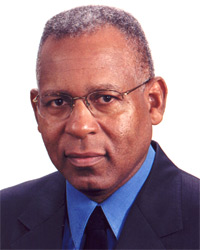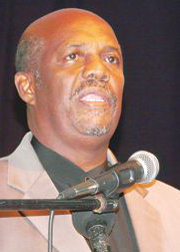
TAIPEI, Taiwan: – Leader of the opposition in St. Vincent and the Grenadines (SVG) Arnhim Eustace wants the Patrick Manning government of Trinidad and Tobago to say if it has changed its position on a plan to rescue the financially troubled British American Insurance Company (BAICO).
“It is a very, very serious matter…. I would like to know, and I am sure that the public would like to know, why Trinidad and Tobago has changed its position on this matter,” Arnhim Eustace said on radio on Monday.
Eustace said comments by SVG’s Prime Minister Dr. Ralph Gonsalves in Parliament last week suggested that there was a change in Trinidad and Tobago’s position on rescuing British American.
He said any such change will have serious implications for SVG, whose citizens and National Insurance Service (NIS) have invested EC$252 million (US$93.3 million) in the failing company.
British American has been placed under judicial management and Organisation of Eastern Caribbean States (OECS) and other Caribbean governments are partnering with investors to form a new company to assume its liabilities.
Gonsalves has lead responsibility for addressing the British American debacle within the OECS and said last week governments of the sub-regional grouping were closer to taking over the operations of BAICO. (Follow I Witness-News on Facebook)
They had secured a favourable ruling from the courts in Antigua and Barbuda, Dominica, Grenada, St Kitts and Nevis, St Lucia and St Vincent and the Grenadines, which must approve a proposal to re-capitalise the entity.
He said a court date for Anguilla was scheduled for Monday and no hearing date had been set for Montserrat but efforts were being made to have the matter heard within the next two weeks.
He said the company would be capitalised at US$400 million (EC$1.8 billion) in contributions from governments of the Eastern Caribbean Currency Union (ECCU) and “certain CARICOM (Caribbean Community) countries, in particular Barbados”, in addition to a liquidity fund.
Trinidad and Tobago had already contributed US$50 million to the liquidity fund and “two strategic investors … highly respected international and regional financial institution” were considering partnering with regional governments to rescue British American, Gonsalves said.

The investors will play “a significant role in the ownership and management of the new company”, Gonsalves said, nothing that regional governments did not want to be involved in the day-to-day running of an insurance company.
The new company will begin operation about six months are its get the judicial go ahead in all eight ECCU jurisdictions, with only Anguilla and Montserrat still awaiting the green light.
Gonsalves however said no arrears of interest would be paid and interest rate in the future will be comparable to those offered by banks.
“These products which were sold were really banking products. And where people were getting eight percent and nine per cent, clearly, we cannot pay that,” he said.
St. Vincent and the Grenadines is expected to contribute EC$41 million (US$15.2 million) to the British American rescue effort.
Eustace, speaking during the Budget Debates in January, said he supported the attempt to bail out the company.
However, he said on Monday that when British American collapsed, the “basis of [his] optimism” came from the assurances of Governor of the Eastern Caribbean Central Bank (ECCB) and the government of Trinidad and Tobago.
“What [Gonsalves’ comments] tells me, is that the government of Trinidad and Tobago is no longer responsible for clearing up the British American matter,” Eustace said, adding that the oil-rich Caribbean nation was contributing far less than anticipated.
British American’s problems result from the financial situation facing its parent company, the Trinidad-based regional conglomerate CL Financial. The Trinidad and Tobago government has pumped billions of dollars into the cash strapped company as part of a rescue plan.

Eustace noted that the new company will not pay interest on existing investments, and future interest rates may be halved while there would not be payments of principal investments until five years after the new company begins operation.
He called on governments and investors to explain the new development to policy holders and other investors in a setting where they could have their concerns addressed.
“I believe that governments … and the companies should be calling people together who are involved in this exercise and bring these matters to their attention,” Eustace said.
He added: “Apart from statements by Prime Minister [Gonsalves], I think this process of informing people has been handled very badly.”
He said with the NIS’s money tied up in British American, this could lead to pressure to increase Vincentians’ contribution to the social security scheme.
He also said many citizens had invested their life savings into the company, with some using it as a retirement fund.
But Gonsalves said regional government was trying to save British American, bearing in mind the interest of their citizens, saying that efforts were also being made to recover the company’s assets in the United States.
“…We have to manage this in a hard nose way. This is the only show in town. If it is not this show, the investors and policy holder, annuitors, will get a number approximating zero. This is really a matter of serious importance for us to go forward.
“…Every effort is being made to ensure that the policy holders and annuitors and other creditors will recover as much of their investment as possible,” Gonsalves said.





